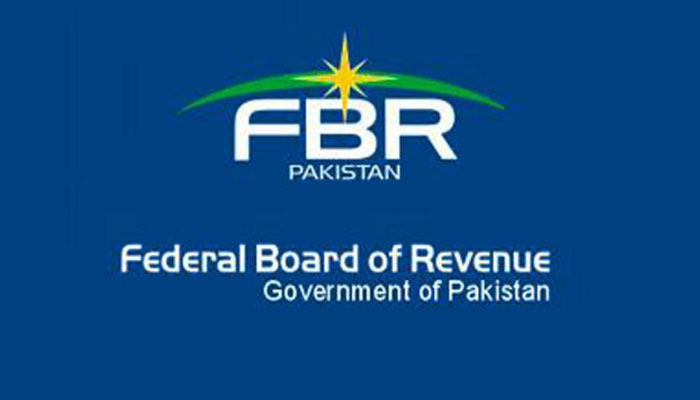FBR mulling over options to fetch additional Rs600bn
ISLAMABAD: The FBR is mulling over different options to fetch additional Rs600 billion through effective enforcement and administrative improvements as well as moving ahead with one-time tax on sectors earning abnormal profits at difficult times, it is learnt.
The FBR’s task for generating additional revenues becomes difficult in the wake of severe slowdown on the economic front in post COVID-19 scenario and secondly the sharp decline in POL prices also makes the task of tax machinery more complicated. It is hard nut to crack so the FBR will have to really strive hard to achieve the envisaged target in next financial year.
The government is all set to fix FBR’s annual collection target at Rs5,000 to Rs5,103 billion for next budget against revised target of Rs3,908 billion for outgoing fiscal, indicating that it requires around 31 percent growth.
One top official of FBR confirmed to The News on Saturday night that with nominal growth of 10 percent (GDP growth of 2 percent and inflation at 8 percent), the FBR’s collection could go up to Rs4,400 billion and the tax elasticity could result in increasing revenues to the tune of Rs4,500 billion.
The remaining Rs500 to Rs600 billion will be the real challenge for the tax collection machinery, said the FBR official and added that the government and IMF were holding technical parleys to expand GST in shape of value added tax (VAT) on whole supply of value chain. The manufacturers, wholesalers and now retailers at all levels must come into tax net, said the official. However, keeping in view difficult situation Pakistani authorities might convince the IMF to delay its full implementation for time being.
Dr Khaqan Najeeb, who has served as Advisor to the Ministry of Finance said that it is estimated for FBR to collect around Rs3,950 billion this year. The way to go from Rs3,950 billion to estimate of around Rs5,000 billion can entail a maximum effort on monitoring, enforcement and compliance.
He said this should, along with nominal growth, give a revenue increase between 15 to 20 percent. “The remaining smaller gap can come by one time taxation of sectors showing abnormal profits,” he added.
Dr Khaqan said there is scope for doing risk based audits which can identify very specific areas where there is a large tax gap. Initiating transfer pricing audits of Multinational Enterprises (MNEs) can help collect taxes dues in Pakistan. He mentioned that other areas like land tax are also possible even as a one-time push.
Dr Khaqan also said that an unprecedented drop in oil prices and subsequent hedging can make room to collect Rs489 billion in petroleum levy and still have a low petroleum price in the country.
When contacted, Chief Executive Officer (CEO) MAFA Capital Muzammil Islam on Saturday said that likelihood to achieving Rs5.1 trillion tax target is possible if we adjust FY20 tax targets with lockdown. He said that the government revenue proceeds would have easily touched Rs4.4 trillion if nation doesn’t fall into lockdown. The biggest risk to revenue collection is declining interest rates and decline in petroleum consumption, he added. The government collected hefty withholding tax (WHT) on account of interest income from both banks and individuals. The debt servicing is estimated to decline by Rs1,000 billion. “More than Rs10 trillion worth of deposits expected to earn 40 percent less from interest income in FY21”, he added.
-
 Katie Price Seen With New Hubby Lee Andrews Weeks After Tying The Knot
Katie Price Seen With New Hubby Lee Andrews Weeks After Tying The Knot -
 Biggest Order Yet Issued Against Andrew Mountbatten-Windsor: King Charles You Have To’
Biggest Order Yet Issued Against Andrew Mountbatten-Windsor: King Charles You Have To’ -
 ByteDance’s Seedance 2.0 Marks New Era Of Cinematic AI-generated Videos: Here’s How
ByteDance’s Seedance 2.0 Marks New Era Of Cinematic AI-generated Videos: Here’s How -
 Struggling With Obesity? Here's How To Manage It
Struggling With Obesity? Here's How To Manage It -
 How Epstein Scandals Are Impacting King Charles’ Healing As Stress Refuses To Relent: ‘Could Spell His End’
How Epstein Scandals Are Impacting King Charles’ Healing As Stress Refuses To Relent: ‘Could Spell His End’ -
 Ciara, Russell Wilson Become Matchmakers For Pals?
Ciara, Russell Wilson Become Matchmakers For Pals? -
 Why Prince William Releases Statement On Epstein Scandal Amid Most 'challenging' Diplomatic Trip?
Why Prince William Releases Statement On Epstein Scandal Amid Most 'challenging' Diplomatic Trip? -
 Historic Mental Health Facility Closes Its Doors
Historic Mental Health Facility Closes Its Doors -
 Top 5 Easy Hair Fall Remedies For The Winter
Top 5 Easy Hair Fall Remedies For The Winter -
 Japan Elections: Stock Surges Record High As PM Sanae Takaichi Secures Historic Victory
Japan Elections: Stock Surges Record High As PM Sanae Takaichi Secures Historic Victory -
 Prince William, Kate Middleton Finally Address Epstein Scandal For First Time: 'Deeply Concerned'
Prince William, Kate Middleton Finally Address Epstein Scandal For First Time: 'Deeply Concerned' -
 Kim Kardashian Promised THIS To Lewis Hamilton At The 2026 Super Bowl?
Kim Kardashian Promised THIS To Lewis Hamilton At The 2026 Super Bowl? -
 Andrew Mountbatten-Windsor Throws King Charles A Diplomatic Crisis
Andrew Mountbatten-Windsor Throws King Charles A Diplomatic Crisis -
 Barack Obama Hails Seahawks Super Bowl Win, Calls Defense ‘special’
Barack Obama Hails Seahawks Super Bowl Win, Calls Defense ‘special’ -
 Pregnant Women With Depression Likely To Have Kids With Autism
Pregnant Women With Depression Likely To Have Kids With Autism -
 $44B Sent By Mistake: South Korea Demands Tougher Crypto Regulations
$44B Sent By Mistake: South Korea Demands Tougher Crypto Regulations




